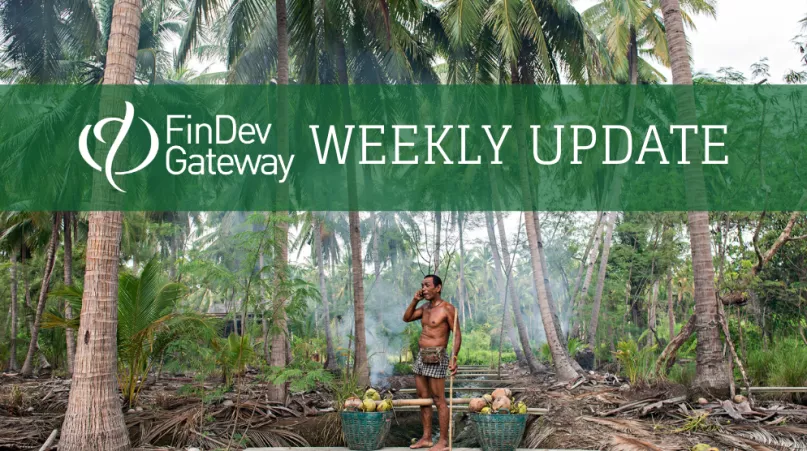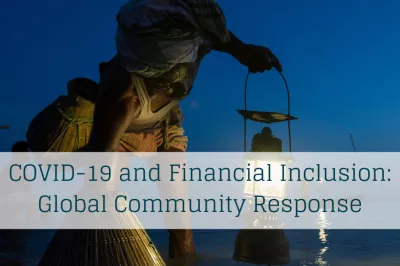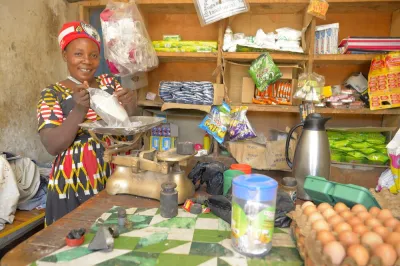COVID-19 FinDev Weekly Update | 17-23 April 2020

FinDev Gateway has created this COVID-19 weekly update with the latest and most relevant knowledge resources for financial inclusion as they become available. Sign Up to receive FinDev's weekly update each Friday with a summary of the main issues covered during the week.
If you have content to share in our weekly update, please submit here or contact us directly.
Weekly Summary
- Microfinance in crisis. In a recent blog, authors call for an urgent rescue plan for the global microfinance sector and propose key principles to help MFIs and their clients survive the pandemic-induced economic crisis, starting with a standstill or moratorium on principal repayments for MFIs. Similarly, authors in another blog post, emphasize the need for providers to have liquidity on hand in order to maintain customer confidence and reduce the risk of panic and large withdrawals.
- Responding to credit quality decline. The global pandemic has created significant adverse impacts on credit quality both due to the inability of clients to make loan payments on time, and the declining value of collateral. To keep clients afloat, authorities are accepting higher levels of risk. Toronto Center advises banking supervisors to make sure that banks use wisely all flexible tools offered by accounting standards to avoid unsound practices.
- Delivering cash transfers to informal workers. Governments can take specific measures to ensure cash transfers reach intended beneficiaries, including those in the informal sector. Countries from Turkey to Togo and Jamaica are using a range of digital solutions, including citizen ID systems, integrated socioeconomic databases, and digital delivery systems to expand the reach of their social safety nets.
- Evidence-based decision-making. The Innovation for Poverty Action (IPA) has launched a rapid data collection initiative to offer policymakers diagnostic data on developments related to COVID-19. The data will help answer questions such as how to design effective social safety nets, reduce adverse impacts on SMEs, protect vulnerable populations, and ensure that children are able to continue education.
- Global remittances expected to decline by 20 percent, according to the World Bank. A recent blog post shows how postal remittance flows are declining for the top 20 remittance corridors, which use the worldwide electronic postal payment network. Posts in several countries continue to maintain their services and are responding to the crisis by staggering branch hours, increasing withdrawal limits through ATMs, and using post employees to deliver cash and essential supplies and medicines.
- Insurance can help manage risks during unexpected crisis, but most insurance markets are unable to do this yet. Policymakers can change this by providing leadership and risk-based supervision, and creating conditions for innovation, among other measures.
Asia
- In India, all major state-owned and private banks have stopped lending to non-banking financial companies (NBFCs), which account for nearly 20 percent of the overall lending in the country.
- Some non-bank lenders in India, including microfinance firms, are joining to issue pooled debt instruments such as bonds. The joint effort is expected to enhance lenders’ credit rating, reduce insurance cost, and help them access the liquidity they need.
- In Pakistan, Easypaisa, a local provider of online financial services, is helping Punjab’s provincial government distribute funds to the local population impacted by coronavirus (COVID-19). The provider also offers customers access to a third-party health insurance plan for coronavirus-related services.
- In Bangladesh, a recent survey shows that only 82 percent of workers in the ready-made garment sector received their salary in cash by mid-April for the work they performed in March. About 8 percent received salary payments that were below the legal minimum wage.
Sub-Saharan Africa
Some articles and knowledge resources referenced in this section are in French.
- In Côte d’Ivoire, the government will transfer $21.9 million to vulnerable households via mobile money.
- Wizall Money, a mobile money provider operating in Senegal, Burkina Faso, Mali and Côte d’Ivoire is making its mobile money services free.
- In Kenya, M-Pesa forecasts a $51.64 million revenue loss (7.3 percent of its annual earnings) due to the elimination of small peer-to-peer transfer charges.
- A new report by the World Bank echoes previous concerns about declining remittance flows and predicts a 23 percent decline in Sub-Saharan Africa in 2020.
- In Morocco, 57 percent of companies have suspended their activities. The hospitality and catering sectors are hit the hardest. South Africa set a $26 billion (around 10 percent of its GDP) rescue plan to protect jobs and provide funding for small businesses.
- Many financial institutions are offering resources to educate clients on how to protect against the coronavirus. A video released by FUCEC Togo, the main MFI cooperative in the country, raises awareness among its customers and employees on best practice for coronavirus protection.
For more on Francophone Africa, check out the latest Portail FinDev Weekly Update in French.
Latin American and the Caribbean
Some articles and knowledge resources referenced in this section are in Spanish.
- Latin America and the Caribbean will not be spared from the decline in remittance flows according to the World Bank, which predicts a fall of 19.3 percent in 2020, more than reported previously by the Inter-American Dialogue. Countries like Ecuador and Colombia that are highly dependent on remittances from the US and Spain are likely to register larger declines.
- Fundación WWB Colombia argues that women’s strategic solidarity and collective strength will be a key element for overcoming this crisis, pointing to the resilience of rural women in the region as an example.
- As the COVID-19 pandemic increases our reliance on technology, financial institutions using open APIs are better prepared to adapt and launch new products. Some banks in Brazil, Mexico and Peru are joining forces to develop instant payments systems that work across a wide range of banking platforms.
For more on LAC, check out the latest Portal FinDev Weekly Update in Spanish.
Arab World
- The Gulf Cooperation Countries (GCC) could take additional steps to protect vulnerable households, including expatriate workers, by making them eligible for cash transfers which could speed up economic recovery.
- Coronavirus is likely to affect women entrepreneurs more than men, especially in regions with high gender inequality like MENA, where women carry the burden of unpaid care work almost five times more than men. A flash online survey conducted by UN Women found that 27 percent of Palestinian women-led MSMEs have shut down as a result of Covid-19.
- The number of mobile wallets in Jordan has recently increased by 20 percent, according to JoPACC, a digital payments solution provider. Egypt-based payment platform Fawry, saw a shift in the type of services consumers purchase since the crisis began, with e-commerce payments dramatically increasing.
- The United Nations Development Program (UNDP) calls for urgent action in Yemen, a country where poverty, inequality and conflict put more than 10 million people at risk of famine.
- The Arab Financial Inclusion Innovation Prize (AFIIP) held its first webinar on the future of digital identity in the Arab World, highlighting expert views, an e-KYC winning solution and the latest regional digital transformation trends, all of which are very relevant to the current global lockdown.
For more on the Arab world and resources in Arabic, check out the latest FinDev Weekly Update in Arabic.
Blogs & Opinion
If you have a blog idea and would like to write for the FinDev Blog, please see our review our guidelines. We do not cross-post blogs that have been published elsewhere, but if you wish to share an existing blog post in our next FinDev Weekly Update, you can send it to us using our contact form.
The Pandemic Will Not Deter Us
Sofia Huizar, Pro Mujer | 23 April 2020 | CFI-Accion
Postal Remittances Are Not Immune to a Pandemic
Saleh Khan | 22 April 2020 | FinDev Gateway
Urgent: A Rescue Plan for the Microfinance Sector
Research During a Pandemic: Leaner and Faster Poverty Measurement in the Time of COVID-19
Keeping the Blood Flowing: Managing Liquidity When Clients Need Deposits
How Education Lending MFIs Are Responding to COVID-19
Insurance in the Age of COVID-19: The Pandemic Highlights the Need for a New Approach
Social Distancing Places a Premium on Mobile Checking and Payments
How Can the COVID-19 Crisis Help Us to Accelerate the Digitization of Payments?
The SDGs Are Falling Short on African Poverty: SME Investment Could be a Game Changer
A Race Against Time: Why We Need Innovation and Evidence to Address COVID-19's Economic Impacts
Recent Publications
For a complete list of publications and to learn how you can share your research with us, visit FinDev's Publications page.
Supervisory Responses to the Impact of COVID-19 on Credit Quality
This note discusses some of the immediate and medium-term options for banking supervisors in response to the COVID-19 outbreak.
Ten Issues for Supervisors During Crises
This Note sets out the main issues that supervisors need to consider in a crisis and offers suggestions for how these might be addressed.
Digital Solutions for Direct Cash Transfers in Emergencies
This note focuses on how digital solutions can help governments deliver cash transfers to their intended beneficiaries efficiently and quickly.
Preparing Stress-Testing and Scenarios With Microvision
This document explains how the Microvision tool can be used by microfinance institutions to develop different important elements for a business continuity plan.
Reaching Households in Emerging and Developing Economies: Citizen ID, Socioeconomic Data, and Digital Delivery
This note discusses the importance of citizen ID systems, integrated socioeconomic databases, and digital delivery systems in extending coverage of social protection during an economic crisis.
View All Publications Related to COVID-19 >
New Data Sources and Information Hubs
View the full list of COVID-19 data sources on the FinDev Data Tracker, and find more resources on our list of information hubs.
Social Protection and Jobs Responses to COVID-19: A Real-Time Review of Country Measures
A "living paper" updated weekly providing a list by country of social protection and jobs responses to COVID-19.
Insurance Regulatory Actions Taken in Response to COVID-19
Tracks actions taken by insurance standard setters and supervisors, for over 20 jurisdictions including countries, regions and U.S. states. To access data, scroll down to the middle section of this page to find the link entitled: Database file: COVID-19 Insurance Regulatory Measures
Funding the Response to COVID-19
Analysis of funding opportunities with summary statistics by donor type, geography and focus area.
covid-finclusion.org
Forum focused on the financial inclusion sector’s response to the COVID pandemic including series of essays from the three organizing partners exploring different topics relevant to the response, as well as guest contributions from key sector stakeholders.
e-MFP: Response to the COVID Pandemic
Responses of e-MFP members, friends and sector stakeholders to the COVID pandemic.
IFPRI: COVID-19 Blogs
A special series of blog posts analyzing the impacts of the COVID-19 pandemic on national and global food and nutrition security, poverty, and development.
View All Organizations Offering Resources Related to COVID-19 >
View All Data Sources Related to COVID-19 >
News
For the latest news on the impact of coronavirus on financial inclusion, visit our News listing pages.
Fintech And Coronavirus: US Stimulus Payments Boosted Mobile Banking Registrations 200 Percent
Consumer use of mobile finance, banking and insurance apps jumped 71 percent in 2019. In 2020, however, they’ve gone from nice-to-have to essential.
At Mercy of Banks, India's Cash-Tight Shadow Lenders Face New Turmoil
All major state-owned and private banks have stopped lending to non-banking financial companies (NBFCs) due to concerns about their financial health.
Is the Coronavirus Killing Off Cash?
Tech firms see the opportunity they’ve been waiting for as shoppers and business recoil from paper money. Who’s hurt when legal tender goes away?
Here's How Non-Bank Lenders Plan to Raise Money
Small non-bank lenders plan to come together and sell bonds that make the cut for bank financing.
Bitcoin ATMs Expand Despite Shelter-in-Place Rules
Tucked into corners of grocery stores, gas stations and transit hubs, crypto ATMs are still allowed to operate amid the coronavirus contagion event. And some are thriving.
Russians Withdrew a Year’s Worth of Cash in a Month Over Coronavirus Fears
Amid the coronavirus pandemic Russians are stocking up on cash.
Microfinance Firms in Turmoil as Collections Come to a Grinding Halt
The lockdown has brought the collection operations of microfinance institutions (MFIs) to a halt, as about 95 percent of the loan repayments are still done through cash.
COVID-19 Puts Focus on Social Responsibility in Asia Pacific
The coronavirus pandemic has magnified and exposed social imbalances in the region – underscoring the importance of financial inclusion as well as environmental, social and corporate governance.
Group of Non-Bank Lenders to Issue Pooled Debt Instruments
This will help firms below investment grade access the liquidity tap since such joint effort would typically enhance their credit rating.
FINCA International Launches Emergency Response Fund for COVID-19
FINCA International mobilized to address the needs of the most vulnerable in the countries where it works, launching the FINCA Emergency Response Fund.
View All Information News Related to COVID-19 >
Webinars
For the latest events - hosted by organizations worldwide - exploring the impact of coronavirus on financial inclusion, visit our Events listing page.
SPTF Investor Webinar: Joint Investor Framework for COVID Response
Webinar Series - Session 6: Financial Planning and Financial Modelling
Business Continuity Webinar Series - Sustainable Finance in Times of Corona – Now More Than Ever!
Business Continuity Webinar Series - What Climate Disaster Insurance Can Teach Us About COVID-19?
View All Events Related to COVID-19 >




